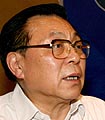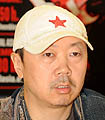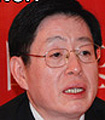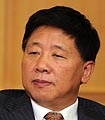| Cooperation Call

Ouyang Ziyuan, chief scientist for the Chinese mainland's lunar exploration program, proposed cross-Straits cooperation in space research during his first visit to Taiwan last month.
While lecturing in Taipei on September 20, Ouyang revealed that the mainland had established a committee for optimizing its lunar exploration program, whose members are from the mainland, Hong Kong and Macao. So far the committee does not include any scientists from Taiwan.
According to Ouyang, data obtained by the mainland's first lunar probe, Chang'e-1, is 100 percent open to space scientists from the island. "We are ready to give our counterparts in Taiwan free access to all we have upon their demand, thus ushering in better cooperation," he said.
Ouyang also expressed his hope that scientists from the mainland, Taiwan, Hong Kong and Macao would finally launch a joint research program to increase the Chinese nation's knowledge of the Moon.
Ouyang, 74, is a cosmochemist and geochemist who was elected an academician of the Chinese Academy of Sciences in 1991. He plays a key role in working out the mainland's lunar exploration program, which is expected to send astronauts to the Moon in about 2017, with a landing some time after that.
Rock in Spain

Chinese rock icon Cui Jian kicked off his first visit to Spain with a live concert in Madrid on September 19 as part of the annual Nuit Blanche (White Night) arts festival. At the invitation of Casa Asia, he also became the first pop singer from outside Spain to perform at the annual Asia Festival, which was held in Barcelona on September 23-24 to showcase Asian art and culture.
In an interview with local media, Cui said that he was optimistic about China's rock music, which is experiencing a renaissance. According to him, China already has several thousand rock bands and a dozen rock music festivals.
Cui, 48, is the first Chinese rock singer-songwriter. He is therefore branded as the "godfather of Chinese rock."
Cui started his music career as a trumpeter in the Beijing Philharmonic Orchestra in 1981. He made headlines in 1986 after performing Nothing to My Name, his most famous rock song, at a Beijing concert to mark the Year of International Peace. His first rock album, Rock 'N' Roll on the New Long March, was released later that year and became a big market hit. Cui has released five albums so far. In 1991, Cui won the MTV Asia Viewers Choice Award.
Religious Affairs Official Changed


The State Council announced on September 21 that Wang Zuoan had been appointed director of the State Administration for Religious Affairs, replacing Ye Xiaowen.
Wang, 51, was the deputy director of the administration, before rising to the leader's chair.
Ye is now first vice president of the Central Institute of Socialism, according to a September 16 report by the China News Service. The institute, founded in 1956, is a political academy cosponsored by non-Communist parties and people without party affiliation in China.
Ye, 59, began to serve as director of the State Administration for Religious Affairs, then the State Council Bureau for Religious Affairs, in 1995.
"We now have military satellites, advanced jets, new main battle tanks, sophisticated warships and subs."
Liang Guanglie, Minister of Defense, saying that some of China's weaponry has caught up with world-leading standards in an interview with Xinhua News Agency before a grand National Day military parade in Beijing on October 1
"It seems to be difficult at the moment, but we need to be patient. We are finding ways to move forward because this is in the interests of all parties concerned."
Liu Jianchao, Chinese Ambassador to the Philippines, reiterating China's call for countries that have territorial disputes with China in the South China Sea to move on with the formula of joining hands in development while shelving disputes at a media forum in Manila on September 22
"There has been no such decision. It should be a political decision. It should be made by the president."
Nikolai Makarov, Chief of the General Staff of the Russian Armed Forces, when asked whether Russia would scrap measures it had planned to counter a U.S. missile defense shield in Eastern Europe after U.S. President Barack Obama decided to shelve the plan on September 17
"It is very hard for local people to accept any foreigners who come to our country and say they are fighting for our freedom. To accept the idea that they are not invaders, that they are not occupiers, is very difficult."
General Azizudin Wardak, the police chief in Afghanistan's Paktia Province, questioning U.S. military officers' assessment that the war was getting worse and could be lost without more troops
"We cannot predict either how severe the [H1N1] pandemic will be, or where it will hit hardest. We all have to be prepared."
Gregory Hartl, spokesman for the World Health Organization. The world body warned in a recent report that H1N1 influenza could kill millions and cause anarchy in the world's poorest nations unless the UN can persuade rich countries to pay for vaccines and antiviral medicine
"Science leaves us no space for inaction now."
Rajendra K. Pachauri, Chairman of the Intergovernmental Panel on Climate Change, warning at the UN conference on climate change that current energy-emissions projections are headed toward worst-case scenarios | 